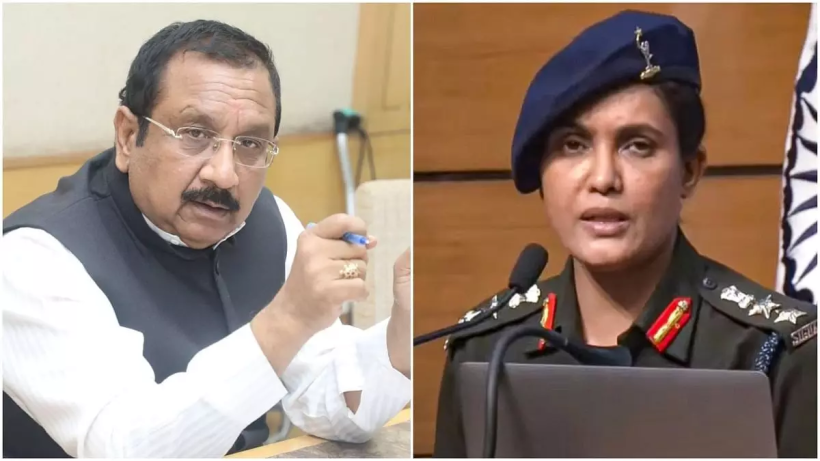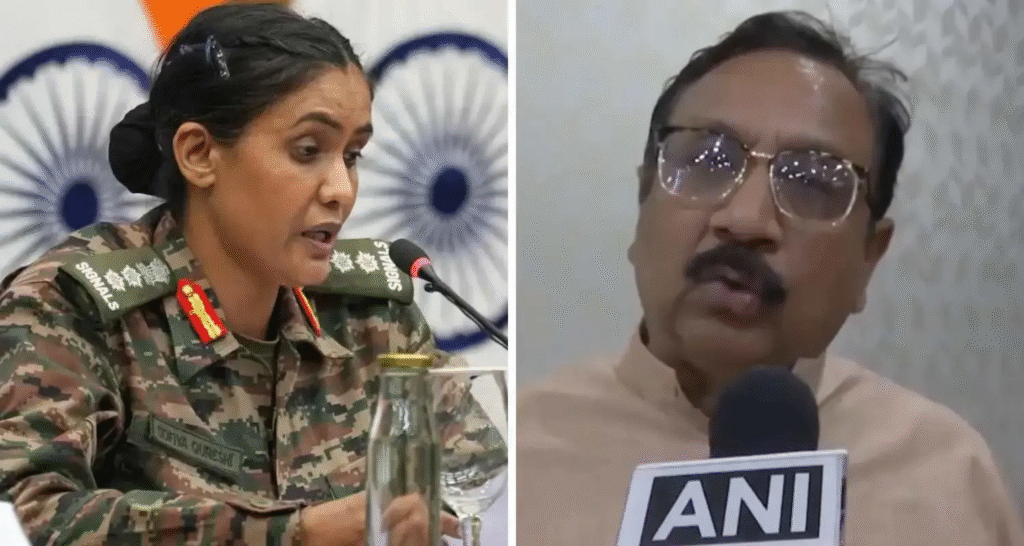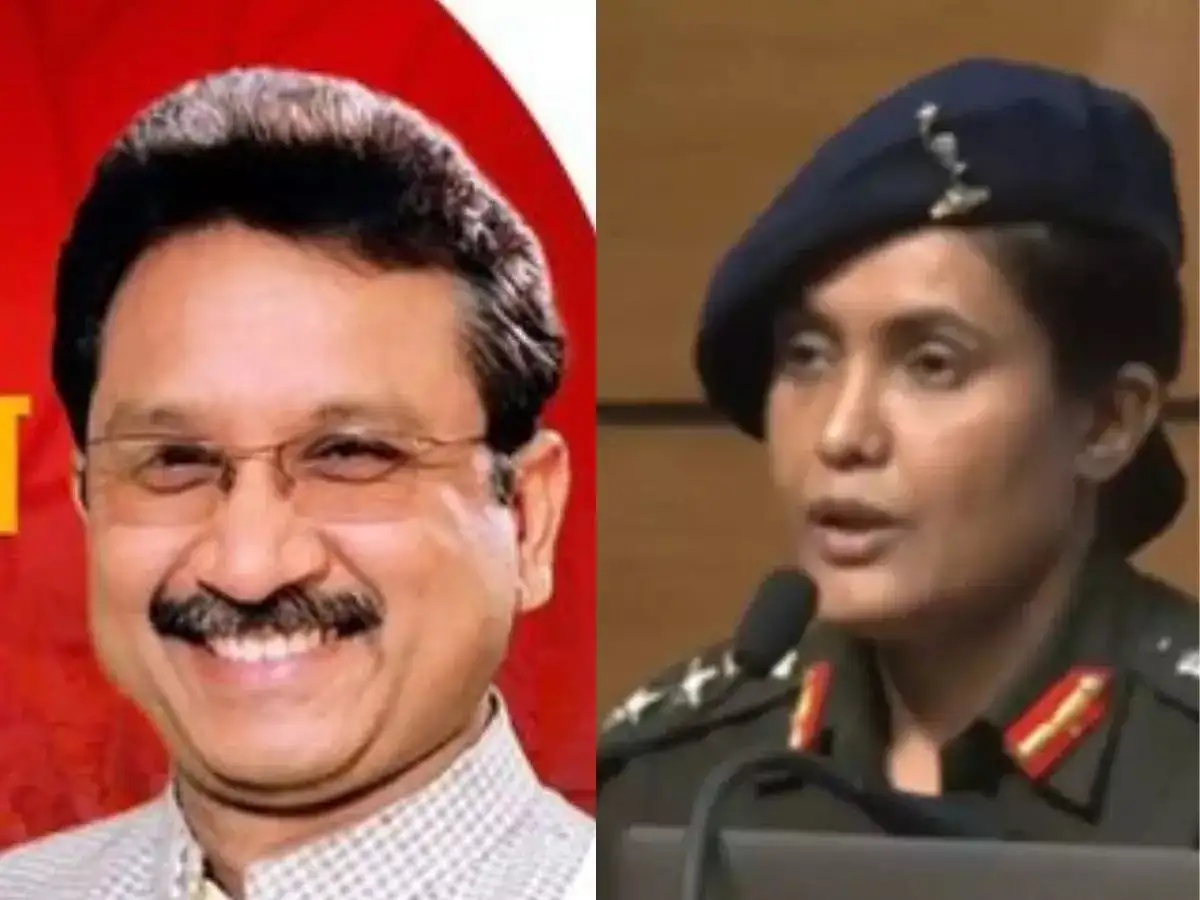
In a politically charged atmosphere in Madhya Pradesh, Minister Vijay Shah has issued his third public apology regarding the controversial remarks he made about Colonel Sofia Qureshi, a respected figure in the Indian Army. This latest apology was marked by an expression of regret framed as a “linguistic mistake” and a heartfelt plea for forgiveness to Colonel Qureshi and the nation. The incident and its aftermath have stirred significant discourse on political accountability, respect for military personnel, and the power of words in public life.
This blog delves deeply into the incident’s timeline, explores the minister’s repeated apologies, examines the public and political reactions, and reflects on the broader lessons for communication, leadership, and national respect. We explore not just what happened, but what this means for governance, society, and the interplay between language and politics in India.
Unfolding of the Controversy: How a Statement Sparked a Storm
The root of this controversy lies in a statement made by Vijay Shah, a minister in the Madhya Pradesh government, regarding Colonel Sofia Qureshi. Colonel Qureshi is not just an army officer but a symbol of valor and dedication, known for her significant contributions to the Indian military. Her service represents a collective pride for many Indians, especially in Madhya Pradesh.
However, the minister’s comments were perceived by many as derogatory and disrespectful. What may have been intended as a casual remark quickly escalated into a public relations crisis. The precise words of the minister sparked outrage because they appeared to diminish the stature and honor of Colonel Qureshi, stirring anger among citizens and members of the armed forces community.
The situation quickly gained traction on social media platforms, where users voiced their displeasure with trending hashtags demanding accountability. Political opponents seized the moment to criticize the minister and the ruling party, amplifying the controversy through press conferences and public statements.
The backlash was swift and widespread. Recognizing the growing storm, Vijay Shah initially issued an apology, claiming the incident was a result of a “linguistic slip.” Yet, the public and media deemed this insufficient, prompting further statements and apologies.
The Third Apology: A Gesture of Humility and Its Significance
In what is now his third apology, Vijay Shah adopted a more conciliatory tone. He acknowledged his mistake as a “linguistic error” rather than an intentional insult and expressed regret with folded hands—a cultural gesture of deep respect and apology in India. He addressed both Colonel Sofia Qureshi personally and the nation at large, signaling the seriousness with which he viewed the incident.
This third apology is particularly noteworthy because it suggests that previous apologies did not fully mollify public anger or restore faith. It also reflects the pressure ministers face in the digital age, where statements are scrutinized instantly, and public forgiveness is neither automatic nor easily earned.
By framing the controversy as a linguistic error, Shah attempts to soften the narrative, perhaps aiming to shift focus from the content of the statement to the unintended nature of the mistake. However, this approach can be double-edged—it may be seen as taking responsibility or as downplaying the issue, depending on the audience’s perception.
The minister’s repeated apologies also indicate political sensitivity, especially because respecting military figures is a non-negotiable value in Indian public life. The incident threatens to undermine that respect, thereby affecting not just personal reputations but also political goodwill.
Public Reaction: A Spectrum of Responses
The public’s response to the minister’s remarks and subsequent apologies has been varied, reflecting the diversity of opinions and emotions involved. Supporters of the minister and some neutral observers emphasize the importance of forgiveness and the inevitability of human error. They view the minister’s third apology as a sincere attempt to rectify the mistake and restore dignity.
Conversely, critics—ranging from political opponents to activists and veterans—demanded a stronger stance, arguing that the apologies, no matter how many, do not erase the damage done by the original statement. For them, the issue is about respect for the armed forces and the message such statements send to the nation.
On social media, veterans and serving personnel expressed particular hurt and disappointment. For many in uniform, respect from public officials is a reaffirmation of the nation’s gratitude, and any perceived slight is deeply felt. This aspect of the reaction highlights the intersection of personal identity and national pride.
Political analysts also weighed in, observing that this episode could have electoral repercussions for Vijay Shah’s party in Madhya Pradesh. The controversy plays into narratives about leadership qualities, sensitivity, and the values politicians embody.
The Role of Media and Social Networks in Amplifying the Issue
This controversy did not occur in isolation—it was shaped and magnified by the modern media landscape. Traditional news outlets, digital news portals, and especially social media platforms played crucial roles in framing the narrative and shaping public opinion.
Breaking news reports alerted viewers and readers across the country to the minister’s statement and the subsequent backlash. Television debates, editorial articles, and opinion pieces dissected the incident from multiple angles, discussing not only the words but their implications for political culture.
Social media, however, was the engine that propelled this controversy into a national conversation. Tweets, Facebook posts, and Instagram stories rapidly circulated the minister’s comments, the apologies, and public responses. The viral nature of these platforms ensured that every word was examined, criticized, or defended, often in real time.
The speed and reach of social media mean that public figures must exercise extreme caution. The minister’s experience underscores how a single statement can spiral into a national controversy within hours, compelling officials to respond quickly and repeatedly.
Understanding the Sensitivities Around Language in India’s Political Context

India’s vast linguistic and cultural diversity makes political language particularly sensitive. Words and phrases can carry different connotations in various regions and communities. Furthermore, given the country’s complex social fabric, statements by public figures are often interpreted through multiple lenses—regional identity, religious sentiment, and social values.
In this context, the minister’s description of his comment as a “linguistic mistake” is telling. It reflects an acknowledgment that the choice of words—intended or otherwise—can cause offense or misunderstanding, especially when addressing figures of national significance like Colonel Sofia Qureshi.
Politicians, therefore, operate under heightened scrutiny. Their communication must not only be clear but culturally aware and respectful. The controversy serves as a reminder that careless language can alienate important constituencies and erode public trust.
Colonel Sofia Qureshi: A Symbol of Valor and National Pride
Colonel Sofia Qureshi embodies the spirit of dedication and courage that defines India’s armed forces. Her military career is a source of inspiration for many young Indians, especially women aspiring to serve in defense forces.
Her prominence in this controversy shines a spotlight on the respect and admiration Indian society holds for its soldiers. For many, any perceived slight against such figures is not merely an individual affront but a challenge to national pride and unity.
By drawing attention to Colonel Qureshi, the controversy inadvertently reaffirmed the high regard in which military personnel are held. This underlines the social contract between citizens and their defenders—a relationship built on respect, gratitude, and honor.
Political Accountability and the Impact on Governance in Madhya Pradesh
The repeated apologies from Minister Vijay Shah highlight an important aspect of democratic governance—accountability. In today’s political environment, leaders are expected not only to deliver policy outcomes but also to exemplify ethical conduct and communication.
This incident demonstrates how public sentiment and media scrutiny can influence governance by demanding responsibility and transparency. The minister’s experience may serve as a precedent, encouraging other politicians to think twice before making controversial statements.
It also reflects a shift in public expectations, where words are as significant as actions, and leaders are judged on their ability to uphold dignity and respect in every forum.
Cultural Significance of Apologies in Indian Society
In Indian culture, an apology is often more than a mere admission of fault—it is a deeply symbolic act reflecting humility, respect, and a desire to restore harmony. The gesture of folding hands (प्रणाम or नमस्ते) while apologizing is traditionally seen as a way to express sincere remorse and seek forgiveness.
Minister Vijay Shah’s use of this gesture during his third apology adds cultural weight to his words, signaling that he is not only addressing a political matter but engaging in a broader moral and social dialogue.
Such gestures resonate with many Indians, reinforcing the notion that leaders must connect with their people not just through policies but through shared cultural expressions and emotional sincerity.
Lessons for Political Communication: The Power of Words and Responsibility
The entire episode offers critical lessons for political communication in India and elsewhere. It demonstrates the enormous power words carry, especially when spoken by public officials whose statements influence millions.
Careless or insensitive remarks can cause unintended harm, damage reputations, and fuel social discord. Conversely, well-considered language can build trust, promote unity, and strengthen democratic processes.
Politicians and their communication teams must prioritize cultural sensitivity, clarity, and empathy to navigate the complex terrain of public discourse. The controversy around Vijay Shah’s remarks is a cautionary tale emphasizing that communication is as vital as any other aspect of leadership.
The Role of Social Media in Modern Political Accountability
The rapid escalation of this controversy also illustrates the double-edged nature of social media in contemporary politics. While it empowers citizens to voice opinions and hold leaders accountable, it can also intensify conflicts and amplify misunderstandings.
For Vijay Shah, social media scrutiny meant repeated apologies became necessary, demonstrating how public opinion can directly shape political behavior. Politicians must now engage with these platforms thoughtfully, balancing transparency with measured communication.
The incident is a testament to social media’s growing role in shaping political narratives and accountability, emphasizing the need for digital literacy and responsible engagement by public figures.
Moving Forward: Healing and Rebuilding Trust
As the controversy subsides, the focus now shifts to healing and rebuilding trust between Minister Vijay Shah, Colonel Sofia Qureshi, and the people of Madhya Pradesh. Forgiveness and reconciliation are vital for moving beyond conflict and restoring mutual respect.
The minister’s gesture of apology is an important step, but trust is earned through consistent behavior and respectful communication going forward. Political leaders must demonstrate through actions that such controversies are learning moments, not recurring patterns.
For the public, this is also a reminder of the complexities of leadership and the importance of holding officials accountable while allowing room for growth and redemption.
Conclusion: A Defining Moment in Madhya Pradesh’s Political Culture
The saga of Minister Vijay Shah’s remarks and apologies over Colonel Sofia Qureshi’s controversy is emblematic of the evolving political culture in Madhya Pradesh and India at large. It highlights the heightened expectations for respect, accountability, and responsibility from public leaders.
This incident underscores the critical importance of language in politics and the social contract between citizens and their representatives. It also reinforces the profound respect that the nation holds for its armed forces and the non-negotiable nature of that respect.
As Vijay Shah continues his political journey, the lessons from this episode will likely influence how he and others communicate, engage, and uphold the dignity of all Indians—especially those who serve the nation with valor.
In the end, this controversy is more than a moment of political turbulence—it is a call for greater empathy, cultural sensitivity, and respect in India’s vibrant democracy.

